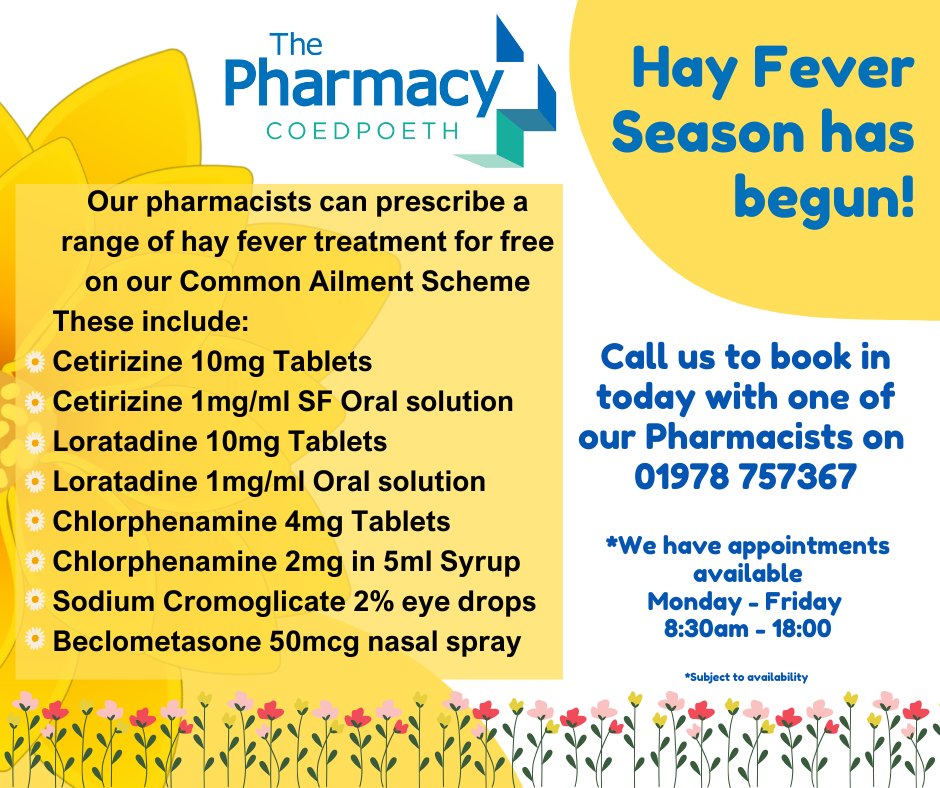Contact
Open Hours
Vaccines
Destinations
HAY FEVER SEASON IS HERE!
We make sure you stay protected from hay fever with our Common Ailments Service.
2
May 2023
Hay Fever Season is here!
Hay Fever Season is here!
Hay fever is an allergic reaction to pollen, it can have an affect to your mouth, nose, eyes and throat. Pollen is a fine powder from plants. It is important to check the pollen forecast on the Met Office website before you start your day.
Hay fever can last for weeks or months, unlike a cold, which usually goes away after 1 to 2 weeks. Get booked in with one of our pharmacists to get medication prescribed so you don’t suffer. At The Pharmacy Coedpoeth, we make sure you stay protected from hay fever with our Common Ailments Service. This is a free NHS service, book in to have a quick consultation with one of our pharmacists and they can prescribe treatment for your symptoms.
Hay fever can last for weeks or months, unlike a cold, which usually goes away after 1 to 2 weeks. Get booked in with one of our pharmacists to get medication prescribed so you don’t suffer. At The Pharmacy Coedpoeth, we make sure you stay protected from hay fever with our Common Ailments Service. This is a free NHS service, book in to have a quick consultation with one of our pharmacists and they can prescribe treatment for your symptoms.
Hay fever can be worse between late March and September, especially when it's warm, humid and windy. This is when the pollen count is at its highest.
Hay fever symptoms include:
• Sneezing and coughing
• A runny or blocked nose
• Itchy, red or watery eyes
• Itchy throat, mouth, nose and ears
• Loss of smell
• Pain around your temples and forehead
• Headache
• Earache
• Feeling tired
If you have asthma, you might also:
• Have a tight feeling in your chest
• Be short of breath
• Wheeze and cough
How to treat hay fever yourself
Currently there is no cure for hay fever and you cannot prevent it however, you can do things to ease your symptoms when the pollen count is high.
• Put Vaseline around your nostrils to trap pollen
• Wear wraparound sunglasses to stop pollen getting into your eyes
• Shower and change your clothes after you have been outside to wash pollen off
• Try to stay indoors whenever possible
• Keep windows and doors shut as much as possible
• Vacuum regularly and dust with a damp cloth
• Buy a pollen filter for the air vents in your car and a vacuum cleaner with a HEPA filter
What to avoid:
• Do not cut grass or walk on grass
• Do not spend too much time outside
• Do not keep fresh flowers in the house
• Do not smoke or be around smoke – it makes your symptoms worse
• Do not dry clothes outside – they can catch pollen
• Do not let pets into the house if possible – they can carry pollen indoors
You can see a GP if your symptoms are getting worse or your symptoms do not improve after taking medicines from the pharmacy.
• Sneezing and coughing
• A runny or blocked nose
• Itchy, red or watery eyes
• Itchy throat, mouth, nose and ears
• Loss of smell
• Pain around your temples and forehead
• Headache
• Earache
• Feeling tired
If you have asthma, you might also:
• Have a tight feeling in your chest
• Be short of breath
• Wheeze and cough
How to treat hay fever yourself
Currently there is no cure for hay fever and you cannot prevent it however, you can do things to ease your symptoms when the pollen count is high.
• Put Vaseline around your nostrils to trap pollen
• Wear wraparound sunglasses to stop pollen getting into your eyes
• Shower and change your clothes after you have been outside to wash pollen off
• Try to stay indoors whenever possible
• Keep windows and doors shut as much as possible
• Vacuum regularly and dust with a damp cloth
• Buy a pollen filter for the air vents in your car and a vacuum cleaner with a HEPA filter
What to avoid:
• Do not cut grass or walk on grass
• Do not spend too much time outside
• Do not keep fresh flowers in the house
• Do not smoke or be around smoke – it makes your symptoms worse
• Do not dry clothes outside – they can catch pollen
• Do not let pets into the house if possible – they can carry pollen indoors
You can see a GP if your symptoms are getting worse or your symptoms do not improve after taking medicines from the pharmacy.
To book an appointment call The Pharmacy Coedpoeth to check availability on 01978 757367.

CONTACT
The Pharmacy, Manchester House
Coedpoeth, Wrexham
LL11 3LS
Coedpoeth, Wrexham
LL11 3LS
01978 757367
INFORMATION
Company Registration:
04708848
Superintendent:
Dhimant Patel (2070775)
Premises GPhC Number:
1043175
OPENING HOURS